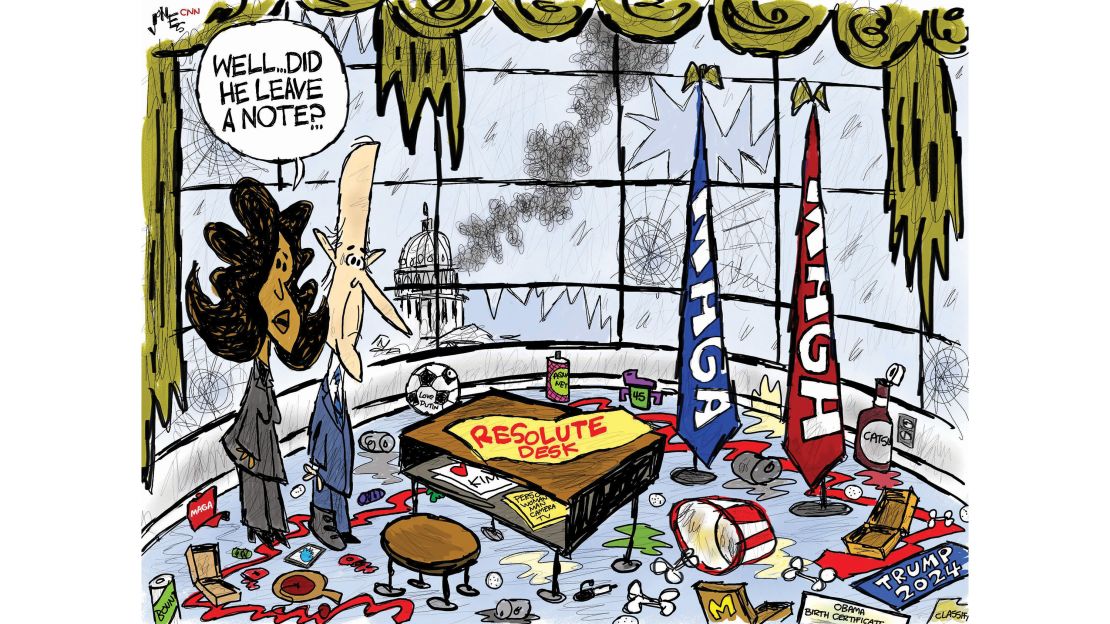Editor’s Note: Sign up to get our new weekly column as a newsletter. We’re looking back at the strongest, smartest opinion takes of the week from CNN and other outlets.
In October, 1954, a chronically ill US senator from Massachusetts, John F. Kennedy, checked into New York’s Hospital for Special Surgery for an operation to treat recurring back pain. When he developed an infection after surgery, his prognosis was so poor that a priest was called to give last rites.
During his slow recovery, Kennedy worked on a book project — with his gifted aide Ted Sorensen playing the central role — that became “Profiles in Courage.” It was six years before Kennedy would be elected president, nine years before he would be assassinated in a motorcade in Dallas. The book, which told the stories of senators who had risked their careers for standing by their principles, became a best seller and won the Pulitzer Prize for biography.
If Americans understood, the book suggested, “the terrible pressures which discourage” a politician from taking an unpopular stance — the possible “loss of his friends, his fortune, his contentment, even the esteem of his fellow men” – they might be “more appreciative of those still able to follow the path of courage.”
Those pressures are intense. As former Rep. Charlie Dent, a Republican who’s spoken out against President Donald Trump wrote, “‘Profiles in Courage’ is a thin book for a reason.” But on Wednesday, at risk of political and personal harm, some Republicans, including one of their leaders, Rep. Liz Cheney, joined with Democrats in impeaching Trump for summoning a siege of the Capitol to stop the counting of Joe Biden’s electoral votes on January 6.
“While many House Republicans reportedly supported impeachment,” Dent observed in a second piece, “only 10 courageous GOP members actually voted for it. If the Senate were to convict Trump and prohibit him from ever seeking high office again, many House Republicans would be most grateful and relieved. It’s called ‘hope yes, vote no.’”
It was the second impeachment for Trump — unprecedented in US history. The first time, no House Republican voted “aye,” and in the Senate, only one Republican, Mitt Romney, voted to remove him from office.
Lt. Gen. Ken Keen, a former military deputy commander of US Southern Command, served 38 years in the US Army. “We ask our military and our young men and women in uniform to put their lives on the line every day in defense of our country,” he wrote. “If political leaders are not ready to do the same and put their careers at risk by taking a stand against those whose actions may have provoked or encouraged the attack on our Capitol, resulting in the death of five Americans, they should resign. They are in the wrong role and do not deserve the honor and privilege to be our leaders.”
When rioters stormed the Capitol, Rep. Cheri Bustos, a Democrat from Illinois, felt the danger. “My goal was to survive,” she wrote, “I quickly realized I was too tall to hide under the seats. I learned in a hurry how to use a gas mask. We evacuated to the safest room we could find …”
“What happened on January 6 was NOT a political act. It was a crime. Violent. Vicious. Premeditated. Lethal. Everyone who incited it and everyone who committed it are perpetrators. And calls for ‘unity’ cannot be simultaneous excuses for this violence. To achieve unity, we must also deliver accountability and justice. I am not a prosecutor and cannot try Donald Trump in a court of law. Impeachment is the only means I have available to stop him from inciting further acts of mayhem, bloodshed and insurrection.”
A warning

Historian Julian Zelizer said Trump’s two impeachments will be remembered as a warning “of the immense dangers that our republic has found itself in after the radicalization of the Republican Party resulted in a near total abandonment of norms and institutional restraints. When partisanship triumphed over the needs of governance and the health of our democratic institutions, violence ensued.”
Republicans who voted against impeaching Trump, Frida Ghitis wrote, were mostly “duplicitous opportunists who claimed at the last moment that the country needed unity after they had contributed to the rhetoric bringing the nation to the precipice of civil war.”
Arick Wierson and Bradley Honan observed that, “for every Liz Cheney, there are more than a dozen elected GOP officials who are still committed to Trump. Despite the fact that Republicans lost control of the House, Senate and White House during Trump’s term, all signs suggest he will continue to control the party as its de facto leader, weighing down the more traditional wing of the party from wresting back control.”
Former FBI agent Asha Rangappa pointed out that “the people who planned and participated in this atrocity will get a knock on their doors from the FBI soon enough. But the domestic terror threat is not limited to that one mob. The very fact that the FBI has issued a threat bulletin to all 50 states reveals that the depraved ideology based on the lie about the ‘rigged’ election spreads far and deep.” She argued, “It is hard to understand how — particularly in light of the many threats of violence made openly by pro-Trump groups and individuals on social media — the FBI and its law enforcement partners were not better prepared for what took place.”
A transfer of power

At noon Wednesday, Joseph Robinette Biden Jr. is due to take the oath of office as 46th president of the United States in an inauguration that will look unlike any other, given the security threat and the Covid-19 pandemic. The 45th president, who for months refused to commit to a peaceful transfer of power, is breaking with tradition by not planning to attend Biden’s swearing-in.
That’s not really a surprise. Trump’s approach to the presidency is the same as the M.O. he brought to the business world, David Axelrod noted: “flagrantly defying rules and norms and undermining institutions.”
“From the moment he descended the Trump Tower escalator in June 2015 and entered national politics with a barrage of incendiary, racist tripe, Trump has routinely and scurrilously lied and sold his self-serving version of events and conspiracy theories. He has willfully and cynically divided and inflamed the country he was elected to lead to suit his own ends.”
Trump’s father taught him that there are two kinds of people – killers and losers, as Axelrod pointed out. “The violent insurrection against the US Capitol and our democracy will be his epitaph. The threat of legal action and disbarment from public office in the future still looms. But the President already has suffered the most painful penalty of all: Fred Trump’s boy will go home a loser.”
Trump is one of only four presidents in the last century to be denied a second term by voters.
As a young Bill Clinton campaign staffer, Paul Begala was there the last time America fired a president: George H. W. Bush. The outgoing president was clearly feeling the pain of his loss in 1992, Begala recalled, but he was “dignity personified … This is where Bush’s amazing grace came in. He was a wounded politician, but more than that he was a patriot.” Clinton told Begala he still recalls the gracious welcome he received at the White House from George and Barbara Bush.
For more on this moment in Washington:
Alisyn Camerota: I’ve had it with interviewing Trump supporters who go off the deep end
Daniel Lubetzky: There’s only one way to stop violent extremists
David Gergen: The perfect symbol of the Trump years
Gaby Goldstein and David Daley: We should have seen the Capitol riot coming
Gregory E. Sterling: Capitol rioters made a mockery of Christian values
Joe Lockhart: Call out Trump’s big lie.
The Senate trial

To Democrats in the House, impeaching Trump was an easy call. The more complicated question is how to handle a trial in the Senate, since the Republican majority leader, Sen. Mitch McConnell, hasn’t indicated he favors holding it before the end of Trump’s term. For the incoming president, the trial poses a dilemma since it threatens to slow both the confirmation of Biden’s Cabinet and the aggressive initiatives he has outlined to fight Covid-19 and revive the economy.
Some Republicans contend that moving ahead with the trial would be divisive.
But Garry Kasparov argued that it’s a mistake to “sacrifice justice for unity. Russians learned this in the hardest possible way after the fall of the Soviet Union.” Leaders decided to abandon a serious investigation of the abuses of the “KGB security state in the interest of national harmony. It would be too traumatic, our leaders said, to expose the countless atrocities the Soviet security forces committed and to punish their authors … The KGB’s name was changed to the FSB and its members quietly stayed in touch and intact. The result? A mere nine years after the Soviet Union collapsed in 1991, Russia elected a former KGB lieutenant colonel, Vladimir Putin, to the presidency. It was the last meaningful election we ever had. We chose unity and we got dictatorship. America should not make a similar mistake.”
GOP senators are wrestling with many questions, wrote Scott Jennings: “I am sure many — if not most — senators are asking: If Trump’s conduct isn’t impeachable, then what is? … If a senator believes Trump to be the wrong person to lead the Republican Party moving forward, and/or that he must be punished for subversive actions, the question then becomes: Does convicting him make him go away faster or does it make him a martyr?”
For more on politics:
Steven A. Holmes: The House could have made a much stronger case for impeaching Trump
Joe Lockhart: How Americans can hold Trump accountable if Congress won’t
Ethan Zuckerman: The real lesson of Trump’s social media silencing
Elie Honig: Impeaching Trump isn’t enough
Covid-19: One year later

January 20 isn’t only the date of the Inauguration. It’s also the one-year anniversary of the first confirmed Covid-19 case in the US — that of a 35-year-old man who survived. “Since that time, more than 23 million Americans (almost 7% of the population) have been diagnosed with the infection and at least 385,000 have died,” Dr. Kent Sepkowitz wrote. “In response, effective treatments, public health containment strategies and vaccines have been developed, but the pandemic continues to worsen, both in the US and in other parts of the world.”
The reality, Sepkowitz noted, is that some of the advice he and other doctors gave in the early months of the pandemic proved to be incorrect. “The year has been extremely humbling. We infectious disease specialists have been wrong repeatedly — a predictable problem with a once-in-a-century event, but still.” At first, doctors minimized the risk and said mask-wearing wasn’t necessary. US scientists stumbled in developing reliable tests to diagnose the disease. Now there’s hope in the form of vaccines, although their rollout has been much slower than predicted. “The Biden team surely is aware of what lies ahead,” Sepkowitz observed. “We can only hope that its decisions will rely on evidence, sound judgment and, most of all, the lonely humility of a doctor caring for a critically ill patient.”
As people in the highest priority groups, including those age 65 and older and those with compromised immune systems, scrambled this week to find a way to get one of the vaccines, Dr. Megan Ranney wrote that “the vaccine does not have to be as scarce as it is. Miscommunication from health officials and an underprepared vaccine distribution system can hinder vaccine administration just as much as slow vaccine production. While some places are overwhelmed by demand, other clinics have thrown out unused doses when individuals did not show up for their injections.”
MLK Day

Martin Luther King Jr. Day this year is especially resonant in the aftermath of the Capitol riot, wrote historian Peniel E. Joseph, author of “The Sword and the Shield: The Revolutionary Lives of Malcolm X and Martin Luther King Jr.”
“The roots of the White supremacist tree that has flourished in the age of Trump are deep, and King combated these forces in his own time with a moral force and power that turned him into a radical political agitator who broke with his former political ally, President Lyndon B. Johnson, on the issue of Vietnam and a revolutionary human rights leader who vowed to help end militarism, racism and materialism before it destroyed American society,” Joseph wrote.
“King would surely shy away from using his holiday as an example of American exceptionalism — and would instead push us toward the hard work of building, for the first time in our nation’s history, a racially inclusive democracy that will ensure that this latest attack on the sacred citadel of American democracy will be the last.”
Don’t miss

Kate Maltby: How much of ‘Bridgerton’ is forgivable?
Jill Filipovic: What GOP lawmakers who refused to wear masks during Capitol lockdown need now.
Nicole Hemmer: This is the right-wing media problem in a microcosm
James Moore: How Ted Cruz wasted his intellect to back Donald Trump’s fraud
Nick Paton Walsh: America was lucky to be saved by its democracy – even if some don’t realize it
AND…
George Orwell in 2021
“1984” author George Orwell, who died in 1950, is one of those thinkers whose eternal curse is to have his acute observations of his own society dragged into contemporary debates to be used and misused.
As Laura Beers noted, when Sen. Josh Hawley’s book contract was canceled because he continued to contest the election without providing solid evidence of fraud, Hawley groused, “This could not be more Orwellian … This is the Left looking to cancel everyone they don’t approve of.”
When a BBC presenter said Trump had inspired “insurrection,” an adviser to the Trump campaign accused him of using “Orwellian language to change what happened.”
Beers, a historian who is preparing to teach a course on Orwell, wrote that while he “opposed censorship, he abhorred the corruption of language by political leaders” trying to cloak “dubious or amoral actions” in the “language of bureaucracy and legalese, or the emotional language of patriotism. One of Orwell’s deepest laments was that, during his lifetime, ‘political speech and writing’ had become ‘largely the defense of the indefensible.’”
“Most likely,” Beers added, “Orwell would not have supported either the de-platforming of Trump, or the cancellation of Hawley’s book contract. But he likely would also have despised both men for their cynical abuse of the English language.”

